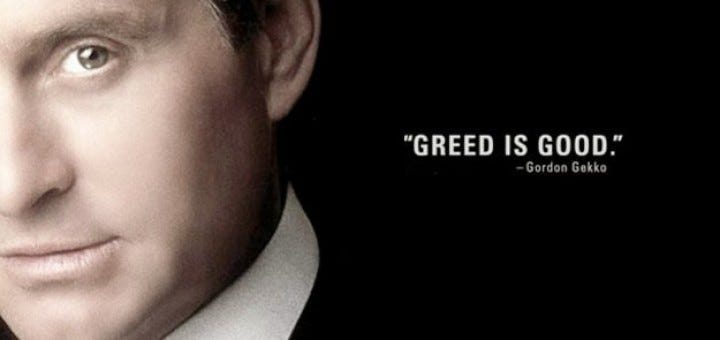American Greed
The Founders didn’t try to tame greed...they built the republic around it. Could that brutal logic be the secret to America’s survival?
“Greed, accident, or malice may have harmful results, but, barring something truly apocalyptic, a resilient system can absorb such results without its overall health being threatened.” - Jamais Cascio
Most Americans are taught to hate greed.
But what if everything they value depends on it?
Freedom. Prosperity. Stability. Not born from virtue…but extracted from vice. The United States doesn’t function despite greed.
It functions because of it.
While other nations built their foundations on ideals…moral philosophy, spiritual purity, centralized authority…the United States was built on a sharper calculus: people pursue power, and they will compete ruthlessly to get it.
The Founding Fathers didn’t try to suppress that impulse. They structured it. They turned ambition into balance. Greed into fuel.
“Greed is good,” Gordon Gekko famously said.
Most thought he was justifying Wall Street excess. But he was unknowingly describing the unsaid core of the U.S. Constitution.
The American political system doesn’t pretend to eliminate human flaws. It converts them into function. That’s not the bug…it’s the blueprint.
That tension…between moral discomfort and institutional necessity…feels dangerous.
And it should.
Because that danger is a reminder of what holds the entire structure in place.
Power: the ultimate currency of mankind
Power has driven wars, toppled empires, and corrupted countless leaders. It is an insatiable force, an ever-burning hunger at the core of every political system.
The United States Founding Fathers knew this truth better than anyone.
But unlike so many political theorists before them, they did not naively attempt to legislate human nature away.
Instead, they weaponized it, constructing a government where greed for power does not lead to tyranny…it ensures freedom.
The Constitution’s three-branch system is not an accident of compromise but a masterstroke of cynical brilliance.
Rather than allowing any one person or institution to monopolize authority, the Founders designed a mechanism where power is perpetually in conflict with itself.
The Legislative, Executive, and Judicial branches exist not as harmonious partners, but as ruthless competitors, each seeking to check and diminish the others.
In this delicate balance, ambition is not a flaw…it is the fuel that has kept the republic alive.
But what happens when that ambition reaches beyond its intended boundaries?
What are the unintended consequences of a system designed to pit power against power?




